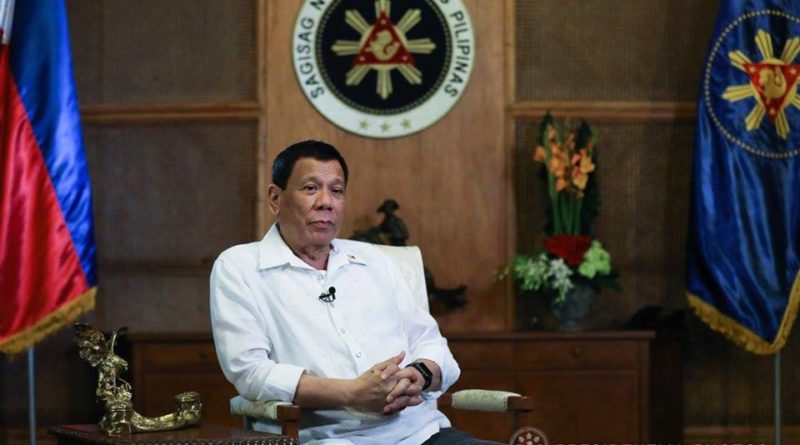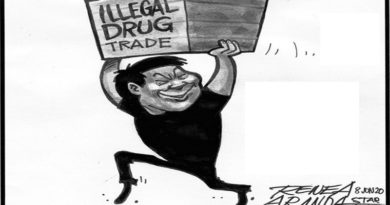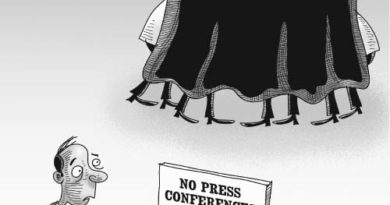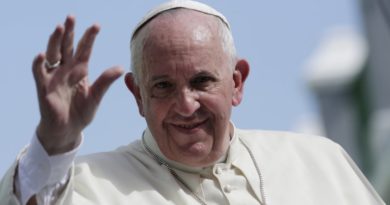OP-ED COLUMNISTS: OPINION ON PAGE ONE BY FRANCISCO TATAD – ‘When it rains, it pours – the Palace in shambles’
EXTREME adversity has led some people to believe that evil in our midst comes now from “powers and principalities,” no longer from mere men misusing their worldly power. This seems to be in full accord with the statement attributed to Blessed Paul VI, when he was Pope, that the “smoke of Satan” had entered the Church itself. As far as these people are concerned, therefore, some transcendental power must be orchestrating the events that have put the Duterte administration to its most severe test.
I cannot say how much theology or science lies in this, but it is an interesting proposition, which compels me to suspend all judgment. These are some of the most recent developments.
The domestic crises
• MRT busted. Last week, thousands of Manila’s commuters lost their train ride for three consecutive days, and were left with only six operational trains afterward. Fixing the Metro Rail Transit (MRT) problems as soon as he became President was one of President Rodrigo Duterte’s campaign promises. It remains unfulfilled, and the problem has grown worse.
• Rice vanishes. The poor lost their access to cheap rice, as the inexpensive variety disappeared from the market, and only the more expensive variety, which they could not afford, remained in the stalls. As if Marie Antoinette had been reincarnated to tell the hungry rabble to “eat cake rather than bread.” For as long as I can remember, no President ever allowed himself to be confronted by a completely avoidable “rice crisis.” Some people are saying that instead of paying P3.5 billion for the deadly Dengvaxia vaccines, which have caused the death of some schoolchildren, the government should have imported inexpensive rice for the poor.
• Train to perdition. A tax reform law—Tax Reform for Acceleration and Inclusion (Train)— that was meant to help the low-salaried workers is now blamed for the skyrocketing prices of gasoline and everything else, punishing the very people it was meant to help. Under this law, those receiving an annual salary of P250,000 and below are now exempt from paying any tax. But sugar-sweetened beverages now cost more, and a pack of cigarettes that used to cost P30 is now P32.50. The price will continue to rise by an additional P2.50 until 2022, after which the tax will rise by 4 percent. For the average worker, to whom a cigarette is often the equivalent of a meal, this is distressing news.
• Investors’ pullout. Some foreign investors who had pledged sizeable investments were reported to have withdrawn their pledges, even as the Philippine peso continued to sink against the US dollar while dollar-earning overseas Filipino workers (OFWs), who were supposed to benefit from the strong dollar, were banned from working in Kuwait, an ill-tempered act offensive to the Kuwaiti authorities. This is going to affect economic growth forecasts, which continue to be hyped in the news, regardless of the cruel realities on the ground.
• Billions lost in traffic. Japan International Cooperation Agency broke the sad news that the insane and demonic Manila traffic, which presidential candidate Duterte had promised to fix in 100 days after assuming office, was costing the nation P3.5 billion a day in wasted man hours on the road.
To illustrate, I recently drove to the Ninoy Aquino International Airport from my home in Quezon City to meet a daughter who was coming home from Tokyo; this normally took a little over an hour on the road. I left my home at the same time my daughter’s plane took off from Narita, and she landed in Manila before I got to NAIA. It took me another four hours to drive back home.
• The Bong Go mess. Special Assistant to the President Christopher “Bong” Go told a Senate committee inquiry, to the delight of the entire Cabinet who had accompanied him to the hearing, and the conscript journalists, who wrote unctuous pieces about Bong Go’s “sterling performance,” that the reports of his alleged effort to intervene in the acquisition of two South Korean frigates worth P15.7 billion, which had appeared in the Philippine Daily Inquirer and Rappler, the online news platform, were all “fake news.” Malacañang then proceeded to punish Rappler, by banning its reporter Pia Ranada from covering DU30 and from entering Malacañang. DU30 or Bong Go had apparently decided that the Palace of the People was now their personal domain. Without having to do anything Pia Ranada has become the poster girl for press freedom, and DU30 has earned for himself the biggest completely avoidable black eye.
• Alvarez meets nemesis. The unrepeatable Speaker Pantaleon Alvarez, who openly brags about his extra-marital affairs and talks down on everyone below his rank, met his comeuppance when the feisty daughter of the President and Davao City Mayor Sara Duterte-Carpio virtually told him to get lost. She gave him more than a mouthful, to which her father added, “You messed with the wrong girl.”
• Tokhang unlimited. With the resumption of the drug war, new killings have been reported, and Philippine National Police Director-General “Bato” de la Rosa, who had supervised the murderous “Operation Tokhang,” which had been blamed for the death of thousands, was indefinitely extended in office upon his scheduled retirement. This has created a lot of grumbling in the PNP, just as the summary removal of Vice Admiral Ronald Mercado as Philippine Navy Chief for disputing the South Korean frigates’ supplier Heavy Hyundai Industries’ (HHI’s) claim of a “sole right” (without the Navy’s participation) to choose the Combat Management System (CMS) to be installed on board the two frigates, may have created deep resentment and suspicions of official wrongdoing among the generals.
The external front
With all these troubling domestic developments, DU30 could ill afford to be occupied with any issue that puts him in direct collision with any large international group or organization, not necessarily the United Nations. But these are precisely what confront him now. There has been a simultaneous eruption on several fronts. It begins with Amnesty International, then moves on to Transparency International, then to the community of democracies listed in the World Democracy Index, and finally to the International Criminal Court at the Hague whose Prosecutor Fatou Bensouda is waiting to commence an “examination” into allegations of crimes against humanity in DU30’s Philippines.
Lawless rule
Since DU30 came into office, Amnesty International (AI) has never stopped breathing down his neck on the extrajudicial drug killings. AI has tried to document the killings not only of drug suspects but also of political activists and journalists, and government attempts to shut down independent media outlets like Rappler. AI has also questioned Congress’ year-long extension of martial law in Mindanao after the government had declared the end of the IS-related Maute terrorism, which was the original basis of the May 23, 2017 proclamation.
Under the Constitution, martial law may be proclaimed only in case of an actual invasion or rebellion, when the public safety requires it, and in areas where is such invasion or rebellion. AI maintains that the martial law extension, without sufficient constitutional basis, is a continuing threat to civilians in Mindanao. AI remains one of the few voices actively questioning what is clearly an unconstitutional declaration.
A corrupt state
Transparency International for its part has ranked the Philippines as No. 111 in its 2017 Corruption Perception Index out of 180 countries surveyed. Recent stories about official corruption had sought to implicate the President’s own son, former Davao vice mayor Paolo Duterte, in a multi-billion-peso drug smuggling scandal, among others. Talk of corruption persists in connection with the importation of rice and other basic commodities, acquisition of defense and military equipment, various contracts involving mining and telecommunications, etc.
Only two Asia Pacific countries have received high ratings in the TI Corruption Perception Index. New Zealand ranks first and Singapore ranks sixth in the overall listing of countries not plagued by corruption. All the others in the top 10 bracket are Nordic and European countries—Denmark, Finland, Norway, Switzerland, Sweden, Luxembourg, Netherlands—and Canada.
Flawed democracy
With respect to the 2017 World Democracy Index, compiled by the Economist Intelligence Unit in London, the Philippines is ranked No. 51, in a listing of 167 that begins with Norway and ends with North Korea. The 167 countries are divided into full democracies, flawed democracies, hybrid regimes and authoritarian regimes. Nineteen are listed as full democracies, led by Norway, Iceland, Sweden, New Zealand, Denmark, Ireland, Canada, Australia, Finland, Switzerland, etc. Fifty-seven are listed as flawed democracies, including the United States, Italy, Japan, South Korea and the Philippines. Thirty-nine are listed as hybrid and 52 as authoritarian regimes, which include China, North Korea, Myanmar, Cambodia, Laos, Vietnam, and Afghanistan.
Because of the Philippines’ poor performance, each of the three global indices could be used to discredit DU30 in any propaganda war. But while he may ignore the individual assessment of Amnesty International, Transparency International, and the Economist Intelligence Unit, he cannot possibly ignore their collective bark and bite, nor can he take for granted the critical judgment of the entire US intelligence community, once it has spoken. As I said earlier in this column, the reported statement was rather bland, and it led one friendly columnist to say the intel community had praised DU30 instead of saying anything derogatory or critical.
Extremely powerful group
But this is the entire community of 16 government organizations, which act separately and together to serve US foreign policy and national security interests. Each of them is a formidable force; together, they define the US security might as a superpower. Headed by the Director of National Intelligence as Administrator, the community, according to Wikipedia, includes the Central Intelligence Agency, Defense Intelligence Agency, Federal Bureau of Investigation, National Geospatial Intelligence Agency, National Reconnaisance Office, National Security Agency/Central Security Service, Department of Energy, Department of Homeland Security, Department of State, Department of the Treasury, Drug Enforcement Administration, US Air Force, US Army, US Coast Guard, US Marine Corps, and US Navy.
By itself alone, what the community says of the DU30 administration could have far-reaching consequences on its immediate future; with the three other institutions issuing their own critical assessments, the implications begin to overwhelm. The situation is bound to become even more unimaginable if and when ICC Prosecutor Bensouda recommends, after her impending “examination” into the allegations of drug killings, to investigate DU30 for any alleged crimes against humanity under the Rome Statute. Then DU30 would have become truly big-time and we would probably finally stop hearing about the despotic rush to inverted federalism.
Pathetic response
I could not understand therefore why the best Malacañang could do was to summon US Ambassador Kim Sung to a meeting with Executive Secretary Salvador Medialdea, whose job description does not quite put him above or as a mandated substitute for Foreign Secretary Alan Peter Cayetano, whatever his limitations, and with the Philippine ambassador to the United States Jose Manuel Romualdez, whose real job is in the US and who has no business doing what he was reported to be doing here with Kim.
I wanted to weep upon reading about all this. But then I heard an occasional companion at Starbucks quote the poetry of W. B. Yeats and the prose of Mao Zedong.
Yeats wrote:
Turning and turning in the widening gyre
The falcon cannot hear the falconer;
Things fall apart, the center cannot hold;
Mere anarchy is loosed upon the world,
The blood-dimmed tide is loosed, and everywhere
The ceremony of innocence is drowned;
The best lack all conviction, while the worst
Are full of passionate intensity.
And Mao said: “There is great chaos under heaven, everything is excellent.”
NOTE : All photographs, news, editorials, opinions, information, data, others have been taken from the Internet ..aseanews.net | [email protected] | For comments, Email to : D’Equalizer | [email protected] | Contributor.











